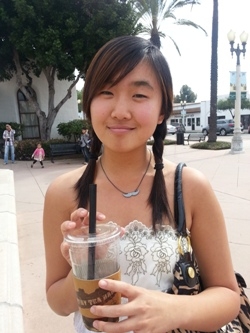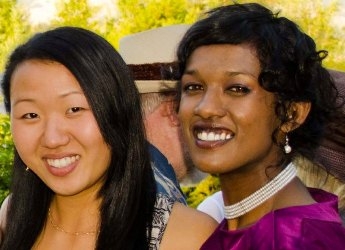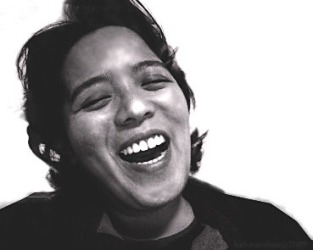Art by Ryan Huertas, www.ryanhuertas.com
Welcome to Hyphen’s The H-spot column, where Hyphen drops mad knowledge
on readers’ questions about the nasty and other prurient delights. Our experts consist of sex goddess Nadia Cho, intrepid medical doctors Monica Hahn and Dharushana Muthulingam, and diva extraordinaire Barbie. Each week, we’ll feature questions that cover health, LGBTQ, and various other burning topics that our prudish parents would disown us from asking.
Feel free to send over more sex questions to Abigail Licad, our fledgling editor-assassin of all things repressed and taboo, at abigail.licad [at] hyphenmagazine.com (abigail.licad[at]hyphenmagazine.com).
Ready to straighten out the kinks in our thoughts on sex and sexuality? Let’s do it!
***
You’d think that in today's “liberated” society, the timing of when to have
sex wouldn't be a big deal. I consider myself to be sexually open and have a
lot of fun with guys. The thing is, when I do have sex with a guy on the first
date or two, he loses interest in me. I don’t get it. I don't believe in the
admonitions against “giving it up too soon,” but unfortunately, it’s been
proven true so far. Is it just me? Should I really have some rule about how
long to wait to have sex?
--Men Don’t Love Nymphos
Dear MDLN,
In my experience, whenever I lose interest in someone after having sex, it’s
nothing personal. It’s just a matter of being over with something that you were
looking forward to. Once the curiosity of what it’s like to lay someone has
been satisfied, some find themselves wanting to pursue other things. It’s
disappointing but it happens, usually unintentionally, with the person losing
interest feeling pretty bad about it. When this happens, don’t waste time
trying to figure things out, you probably don’t want to go for someone who does
that to you anyway.
Before you sleep with a new person, figure out what your intentions are. If
it’s someone you want to keep seeing, then draw out the mystery and keep them
guessing. Waiting until the third date is probably as far as you need to go.
But if you want to wife up the fool, I hear waiting until the fifth date is the
golden rule. If you just want sex, then don’t think much about whether that
person wants to see you again once you get what you wanted.
It’s just human psychology -- people always want what they don’t have. Not
knowing and wondering what it’s like builds anticipation and it’s more exciting
for both partners when it finally does happen. Men love nymphos -- they just
like feeling like they worked for something first.
--Nadia

Nadia Cho is an undergrad at UC Berkeley majoring in psychology, with strong interests in sociology, Asian American Studies and gender and women’s studies. She was a Sex on Tuesday columnist at UC Berkeley’s student paper The Daily Californian. She continues teach sex positive thinking and living at her blog nadiacho.com. Her hobbies include drinking coffee, playing with cats and being sassy. She secretly loves Tumblr and kale.
***
Sometimes I wonder -- what is the big deal about sex? It's
fun enough, but sometimes it’s so awkward, messy, complicated and risks too
many freaky infections. I'm 28, and I have plenty of other things to worry
about. For real though: is it worth it?
-- Chasing Tail is Hard to Do
Dear Chasing Tail,
We admire your healthy skepticism!
The media and medicine often focus on the health risks of sex such as STDs,
unplanned pregnancy, and abuse. These are definitely serious issues. But sex is
also just a big part of animal life -- as procreation, communication and
recreation. A sex-positive approach recognizes that sex can also be awesome and
fulfilling. And -- studies seem to say -- good for your health!
One study by the Psychology
Department at the State University of New York at Albany shows
that penile-vaginal intercourse is associated with lower depression rates in
women. The study speculates that hormones in semen may improve mood. This type
of sex also seems to lower blood pressure and improve stress recovery (also
see last week’s post on sex and healthy hearts!). Another study finds that sex
can increase production of the the “pleasure hormone” oxytocin, giving
us a feeling of well-being and connectedness to our partner (the same bonding
hormone is released in mothers when they breastfeed or touch their babies).
Mo’ sex, less death: increased frequency of sex lowers mortality measures in
both men and women. Men who had
sex less than once a month (or refused to answer) had twice the death
rate of men who had sex at least twice a week. What we are saying is: sex can
save lives.
These studies are small and
limited to only penile-vaginal intercourse. Nevertheless, they show growing
evidence that sex can be good for your mental and physical well-being. It does
take work to play safe, develop healthy relationships and get skilled. But
challenging existing stigma and promoting sex positivity can help us be frank
about both the joys and dangers of sex. A good resource is the San Francisco
Sex Information Center.
Bottom line -- sex is great!
Whether from chemical magic of genital fluids or from authentic human
connection, healthy sex can bring about bodily, psychological and existential
well-being, and is certainly more fun than Lipitor. Good Luck!
--Monica and Dharushana

Doctors Monica Hahn and Dharushana Muthulingam
Monica Hahn (L) is a resident physician at the UCSF Family and Community Medicine Residency at San Francisco General Hospital. She received her MD from UCSF School of Medicine and her MPH from the UC Berkeley School of Public Health. She has been involved in community-based youth empowerment advocacy, as well as HIV prevention projects. She is currently interested in adolescent health, HIV prevention and sexual health. She enjoys capoeira, Afro-Latin dance, and Brazilian percussion.
Dharushana Muthulingam (R) is a resident physician in the department of Internal Medicine of the Kaiser Medical Center in Oakland. She studied medicine at UCSF and public health at UC Berkeley. She is interested in infectious disease, healthy aging, health justice and working with patients to live the good and flourishing life. In her spare time, she has been attempting to read David Foster Wallace's Infinite Jest. After two years, she is happy to report she is almost half way done.***
I am the primary caretaker for my brother who's 12 years-old. I have a
feeling that he might be gay (although I know it's impossible to tell at his
young age). How should I deliver the birds and the bees talk while
incorporating LGBTQ issues? Are there any special circumstances or precautions
I should explain to him in case he or anyone he knows enters into a same-sex
relationship?
--Single Sibling
Dear Single Sibling,
Remember
being 12 years-old again, in between gaining a vague understanding of what
works and “ooops”? If you get the vibe that your brother is becoming curiouser
and curioser right now, then it’s time for “The Talk”.
You
must understand first that your brother is the expert of his own person and
life. Make no assumptions about his preferences. Maturing into an adult takes a
lot of self-experimenting and bold expression, so defining his sexuality has to
be on his terms, when he is ready. You need to reassure him that his chosen sexuality doesn’t change
things negatively between you two. Hold back from projecting your needs and
anxieties, thinking that this will help him. Your goal should
be for your brother to trust you and come to you when he has questions. Ask him
what he knows and ask him what he would like to know further. By being his ally
and reassuring him that his feelings and questions matter, he will be empowered
to open up.
Buzz
through your local chapter of PFLAG (Parents and Families, Friends and Allies
United with Lesbians and Gays and Transgender Network) and
make full use of the resources they offer. In their mission statement, PFLAG
“provides opportunity for dialogue about sexual orientation and gender
identity, and acts to create a society that is healthy and respectful of human
diversity.” You’ll not only gain useful insight, but also widen your circle
of friends and connections supportive of the LGBTQ and Trans community.
In
encouraging your brother to open up, educating yourself on LGBTQ issues and immersing
yourself in the community, you will be better able to guide your brother toward
a safe and healthy state of mind and well-being, no matter what his preferences
end up becoming. He will learn to make personally responsible choices for
himself, his lovers and others, able to tell the differences between sex and
intimacy, including consent and respect. So long as your brother finds his home
to be a safe haven for having his concerns addressed and feels accepted as his
own person, he will think and choose wisely.
--Barbie

Barbie
Barbie is your sister and pal in all things love and taboo. NYC-based, she loves long walks on city streets, watching sunsets over the river, farming and looking for the next big thing. She's your wellness connector, media maker, and fellow troublemaker. She loves her food homestyle, hands down. If you're ever in NYC, look her up to chat and chew.










Comments